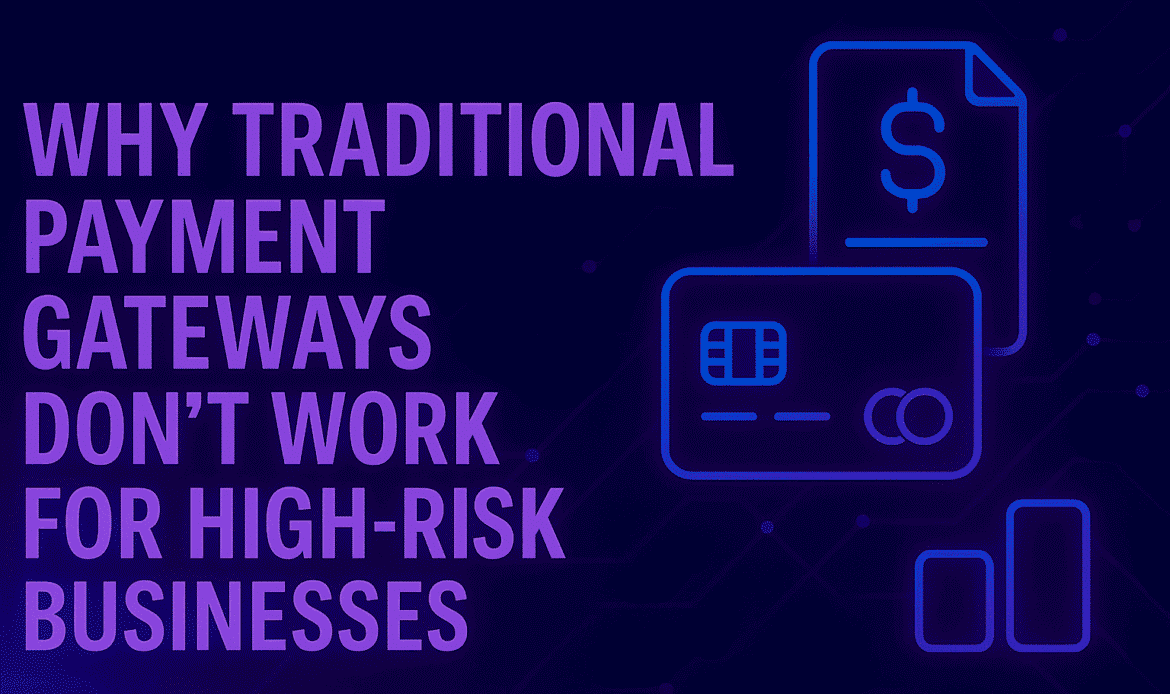Running a high-risk business in 2025 comes with unique challenges. From compliance hurdles to higher fraud risks, companies in industries such as gaming, adult entertainment, CBD, nutraceuticals, and financial services face obstacles that standard solutions cannot handle. One of the biggest pain points is finding the right high-risk payment gateway.
At first glance, a traditional payment gateway might look like an easy solution. However, as soon as a high-risk merchant starts processing transactions, problems quickly appear. Understanding why conventional providers fail is the first step toward building a stable and scalable payment strategy.
The Problem with Traditional Gateways
1. High Decline Rates
Traditional providers are built to support low-risk industries like retail or digital subscriptions. When a high-risk company tries to process payments, the system flags transactions as suspicious. This leads to higher decline rates, lost revenue, and frustrated customers.
2. Sudden Account Freezes
Banks and acquirers connected to standard gateways often freeze accounts without warning. For a high-risk business, this can mean thousands of euros locked overnight. Without access to funds, operations stop, and the business suffers immediate losses.
3. Strict Underwriting Policies
Traditional payment providers use rigid risk models. If your business falls into a category like gaming or crypto, you are automatically rejected. Even if you get approved, you may be placed on strict limits that prevent scaling.
4. Lack of Multi-currency and Alternative Payment Options
Global high-risk businesses rely on IBAN transfers, crypto payments, and local methods to reach international customers. Standard gateways usually offer only card processing, making it harder to compete globally.
👉 If your company depends on flexible settlement methods, consider opening an IBAN account or combining payments with crypto solutions. For more details, check our earlier guide: Open Your Euro IBAN Today.
Why a High-risk Payment Gateway Is Different
A high-risk payment gateway is designed to meet the specific needs of industries that operate under regulatory scrutiny. The difference is not just in approval rates but in the way transactions are managed.
- Adaptive Risk Monitoring – Instead of blocking all unusual transactions, high-risk gateways apply smart monitoring, reducing false declines.
- Chargeback Protection – Built-in tools help merchants manage disputes and keep ratios within acceptable limits.
- Global Reach – Support for SEPA, SWIFT, and crypto ensures smooth settlement no matter where your customers are.
- Higher Approval Rates – Since the provider specializes in high-risk sectors, more transactions go through successfully.
For example, Sharpay provides a mix of merchant accounts and virtual cards that help businesses process payouts and deposits globally. This flexibility cannot be achieved with traditional providers. If you want to see how virtual cards change online commerce, check Best Virtual Debit Card for Global Payments.
Scaling High-risk Businesses with the Right Gateway
The right payment infrastructure allows a high-risk company to focus on growth instead of worrying about frozen accounts. For instance:
- An adult content platform can set up recurring billing safely.
- A nutraceutical brand can process international card payments and offer SEPA transfers.
- A crypto exchange can combine fiat and crypto settlements in one platform.
To see how global businesses already benefit from flexible setups, read our article Virtual Cards for Affiliate Marketers: The Ultimate 2025 Guide.
Choosing Sharpay as Your Partner
High-risk businesses need more than a basic processor. They need a partner who understands regulation, risk, and global payments. Sharpay offers:
- High-risk merchant accounts with fast onboarding.
- Crypto and fiat settlements through IBAN.
- Virtual cards for payouts and team expenses.
- Mass payments in EUR, USD, and USDT.
By choosing a specialized high-risk payment gateway, your business avoids the traps of traditional providers and gains the flexibility to expand globally.


